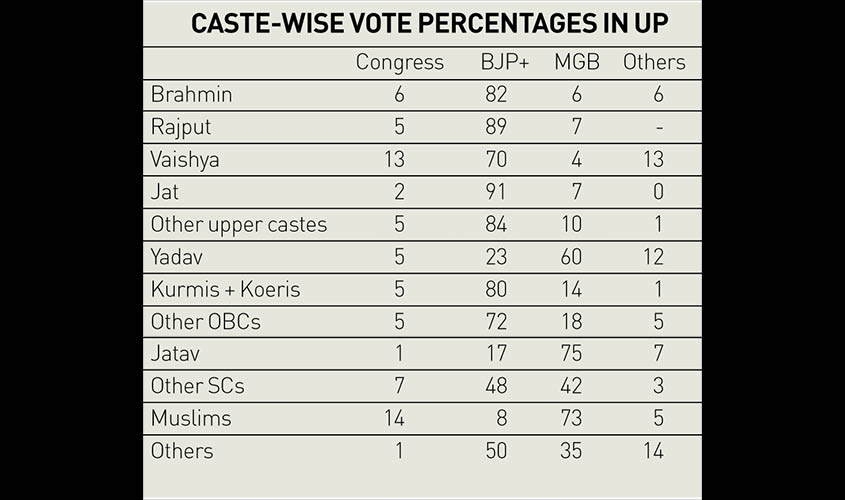Multiple factors led to Mahagathbandhan’s miserable failure in the state.
The BJP’s major dent into non-Yadav OBC and non-Jatav Dalit voters, coupled with the Mahagathbandhan’s failure to provide “chemistry” resulted in the Mahagathbandhan’s defeat in the Lok Sabha elections in Uttar Pradesh. Also, the Jat community, which has traditionally been with the Rashtriya Lok Dal (RLD), has almost dumped it, and gone almost completely with the BJP.
Before the Lok Sabha elections, arch rivals Samajwadi Party (SP), Bahujan Samaj Party (BSP) and Rashtriya Lok Dal (RLD) forged the alliance, which was branded as the Mahagathbandhan (MGB). However, following the dismal performance of the MGB, BSP chief Mayawati announced walking out of the alliance (for now). She said that her party would not contest the coming bypolls with SP. The collapse of the alliance put a question mark over the credibility and longevity of such alliances. According to a post-poll study conducted by the CSDS-Lokniti, about 23% Yadav voters voted for the BJP, and about 80% Kurmi and Koeri voters went with BJP. Similarly, 72% of other OBC voters preferred BJP, which led to its impressive performance. The BJP got 62 out of UP’s 80 seats, while its alliance partner Apna Dal got two. Vote percentage share of BJP was 49.56%, SP 17.96%, BSP 19.26%, RLD 1.67% and Congress 6.31%.
Similarly, while the MGB got votes of 75% Jatavs, 48% of non-Jatav Dalit voters voted for the BJP and 42% of them for the MGB. As per the study, 8% of Muslim voters supported BJP. The study was conducted by Mirza Asmer Beg, Professor of Political Science at the Aligarh Muslim University, Shashikant Pandey, Professor of Political Science at Babasaheb Bhimrao Ambedkar University, and Sudhir Kare, Associate Professor (Retired) DAV College, Azamgarh.
Jats, interestingly, who have been voting for the RLD traditionally, have drifted away from it. As per the study, most of them did not vote for the RLD. The study says about 91% Jat voters supported the BJP in the elections.
Speaking to this newspaper, Professor Beg said: “The alliance between the SP and BSP was opportunist. They just thought that arithmetic will be sufficient to win the elections, but they failed to realise that Prime Minister Narendra Modi had the chemistry which overtook the arithmetic. However, between the two, it was Mayawati who benefited more from the alliance. Her party got 10 from zero, while Akhilesh Yadav’s SP tally remained at 5, which was there in 2014.”
Explaining further, he said this lack of chemistry was the reason for MGB’s defeat in Bihar as well. “In 2015 Assembly elections, JDU and RJD forged an alliance which added to their arithmetic. But at that time, Nitish Kumar’s track record of good governance and Lalu Prasa Yadav’s charisma added chemistry to it and, therefore, the MGB came out victorious. Such a chemistry was missing in Uttar Pradesh,” Professor Beg said.
On Mayawati’s allegations that SP votes did not transfer to BSP, Professor Shashikant Pandey said: “Both were beneficiaries of the alliance to some extent. But there are multiple reasons for the defeat. Though the alliance was sealed at the top level, it could not percolate down to the ground level. We feel that it was not an unnatural alliance. There is a point of convergence for the two parties. Both are based on the social justice plank. But the casual and sudden manner in which the alliance was worked out, went against it. Had the alliance been sealed about a year ago, their performance could have been better.”
He added that while the two parties thought that they would win the elections by just announcing the alliance, they did not work on the ground to ensure transfer of votes. “In contrast, the BJP was doing micromanagement at the ground level. Its cadre was meeting voters at the booth level. This kind of micromanagement was missing in the MGB. There was one more interesting thing during the study. We found that the BJP voters were enthusiastic about voting for the party, which was not the case with MGB or Congress voters.”

The MGB was formed in the hope that SP and BSP, the two major parties of the alliance, will ensure the transfer of their traditional voters to each other in their corresponding seats. And this hope was not unfounded. They had done the experiment in byelections in Gorakhpur, Phulpur and Kairana a few months ago, and it clicked, but not in the Lok Sabha elections.
The consolidation of Yadav voters, who have traditionally been with the SP, was not as strong as it should have been. Only 60% of them voted for the MGB, down from 75% in the last Assembly elections when SP had alliance with the Congress. The study, however, says that the BSP was able to hold on to its core Jatav voters, but could not get support of non-Jatav dalit votes for the MGB.
As for Muslim votes, these went to MGB in a big way (73%), but at the same time, about 14% of them voted for Congress. This shows a clear division of Muslim votes.
Therefore, there was massive consolidation of upper castes, Kurmis and Koeris, non-Yadav OBs, non-Jatavs, which was more than the consolidation of Yadavs, Jatavs and Muslims.
The study also highlights the popularity of Narendra Modi, which helped BJP consolidate its vote share. Though there were local issues, it probably did not matter and people voted keeping in mind that it was a national election. The study says BJP got 12% votes due to the Modi factor alone. It says that the MGB, as well as the Congress, failed to give an alternative narrative. Though they raised issues of unemployment, farmers’ distress, demonetisation, GST etc, they could not offer a credible alternative. Their election campaign was negative and centred around the call to remove Modi from power.

